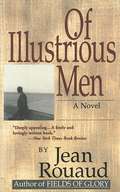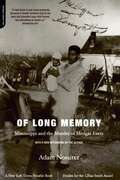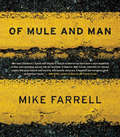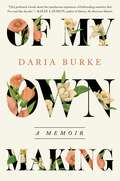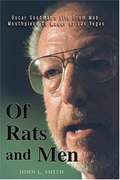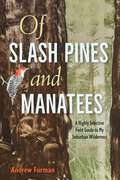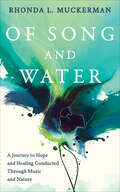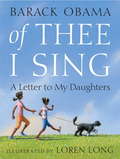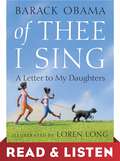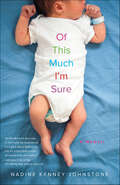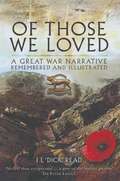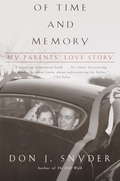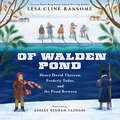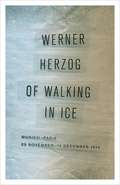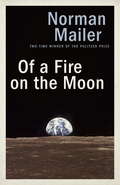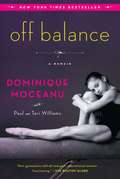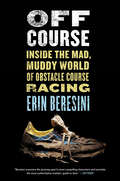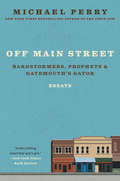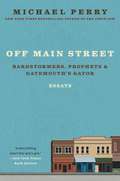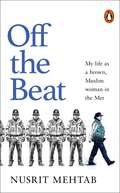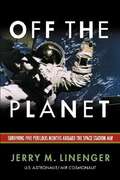- Table View
- List View
Of Illustrious Men: A Novel
by Jean RouaudHailed as a masterpiece, Jean Rouaud’s first novel, Fields of Glory, was awarded France’s most prestigious literary prize, the Prix Goncourt, and sold over a million copies worldwide. Of Illustrious Men establishes as fact what the first novel promised-that Rouaud is a writer of remarkable power, subtlety, and originality. Lovingly set in the same region as Fields of Glory, the novel is about the author’s father, Joseph, and a traveling salesman who died at forty-one and left a family in shock behind him. In the mind of the grieving eleven-year-old son-too young to have really known him-his father was a hero, a warrior, a legend of the Resistance during World War II. But the narrator is no longer that eleven-year-old boy; he is a mature and gifted writer. And though he may still ache for the loss of his father, he also knows that Joseph’s illustriousness can be found not only in the heady days of wartime glory but in moments of domestic tranquility. Of Illustrious Men evokes scenes of both war and peace with exquisite beauty and understated and poignant tenderness.Skyhorse Publishing, as well as our Arcade, Yucca, and Good Books imprints, are proud to publish a broad range of books for readers interested in fiction-novels, novellas, political and medical thrillers, comedy, satire, historical fiction, romance, erotic and love stories, mystery, classic literature, folklore and mythology, literary classics including Shakespeare, Dumas, Wilde, Cather, and much more. While not every title we publish becomes a New York Times bestseller or a national bestseller, we are committed to books on subjects that are sometimes overlooked and to authors whose work might not otherwise find a home.
Of Long Memory: Mississippi and the Murder of Medgar Evers
by Adam NossiterThe history is well known: On June 12, 1963, Mississippi's courageous NAACP chief, Medgar Evers, was gunned down by white supremacist Byron de la Beckwith. Tried twice by all-white juries, Beckwith escaped conviction for three decades. But then Mississippi began to confront its tormented past. And in the 1990s, when Beckwith was sent to jail by a crusading young prosecutor, the family of Medgar Evers finally got justice. Hailed as a New York Times Notable Book of the Year and a finalist for the Lillian Smith Award, Of Long Memory reveals how this remarkable reversal took place. Nossiter uses the tools of memory, history, and reportage—and the clear vantage point of an outsider, a Northerner—to portray an entire state quite literally summoning up its ghosts. A new epilogue discusses other civil rights cases now being reconsidered, and skillfully shows how the South is finding a way to create justice where none had existed before.
Of Mule and Man
by Mike FarrellIn May 2008--shortly after being named by the Los Angeles Times as a "Person of the Year"--Mike Farrell drove himself across the country on a book tour like no other. Networking with political groups (and friends like Joseph Wilson and Valerie Plame), Farrell has redefined the very concepts of book touring and "promotion" through a progressive lens.Best known for his eight years on M*A*S*H and five seasons on Providence, Mike Farrell is also a writer, director, and producer. Farrell has served on human rights and peace delegations to many countries around the world. His first book, Just Call Me Mike (Akashic Books, 2007), was a Los Angeles Times bestseller.
Of My Own Making: A Memoir
by Daria BurkeWe are not defined by our origin stories. We choose who we become. Daria Burke&’s childhood growing up under the shadow of an absent father and a mother debilitated by drug addiction was marked by neglect and poverty. Despite these fractured beginnings, she forges a triumphant path out of Detroit and into fashion&’s C-Suite. After ten years of therapy, she believes her healing journey is complete. When she discovers a photograph of the car accident that she believes altered the course of her early life, Burke is forced to confront the parts of her childhood she had avoided. This discovery sparks a four-year immersion into neuroplasticity, epigenetics, the impact of adverse childhood experiences on early brain development, and ultimately, why some of us remain stuck in past trauma while others experience post-traumatic growth. She dives headfirst into an exploration of her trauma, grappling with the enduring grip of the past on the present and the mind's influence over the body. More than a story of personal triumph, Of My Own Making is a soulful and scientific exploration of the power to shape one's destiny. In facing the stark reality of her past, Burke reminds us that every moment demands a choice, and that we owe it to ourselves to reparent our inner child and reclaim the lives we deserve. Burke&’s lyrical account of a life lived with courage and intention offers an empathetic and hard-won perspective on the nature versus nurture debate and the power of acceptance. Part memoir, part methodology, it is a fearless rallying cry inspiring us to excavate and examine the stories that define our lives. Ultimately, the narratives that we craft with our own hands are the only ones that matter.
Of Rats and Men: Oscar Goodman's Life from Mob Mouthpiece to Mayor of Las Vegas
by John L. SmithFor more than 35 years, Oscar Goodman was the country's pre-eminent defense attorney for alleged gangsters. His endless client list included Meyer Lansky, Nick Civella, Anthony Spilotro, Frank Rosenthal, Jimmy Chagra, Natale Richichi, Nicky Scarfo, and Vinny Ferrara, along with many others. Though no further connection between Goodman and the Mafia has ever been proved, the famous litigator has often been accused of being more than just a mouthpiece for organized crime. Was Oscar Goodman only what he claims, an attorney who defended his clients based on the simple principle that they, too, have constitutional rights? And if so, how did he manage to mingle with the mob for decades without becoming part of it? After scores of unlikely courtroom victories, Goodman pulled off an even more unlikely career change. Twice elected mayor of Las Vegas, he went from legal spokesman for the most notorious crime figures of our era to political spokesman for the most notorious city in the country.
Of Silence and Song
by Dan Beachy-QuickMusings on joy and suffering, midlife and meaning, by a National Book Award–nominated poet and essayist praised for his “fine ear” (Publishers Weekly).Midway through the journey of his life, Dan Beachy-Quick found himself without a path, unsure how to live well. Of Silence and Song follows him on his resulting classical search for meaning in the world and in his particular, quiet life. In essays, fragments, marginalia, images, travel writing, and poetry, Beachy-Quick traces his relationships and identities. As father and husband. As teacher and student. As citizen and scholar. And as poet and reader, wondering at the potential and limits of literature.Of Silence and Song finds its inferno—and its paradise—in moments both historically vast and nakedly intimate. Hell: disappearing bees, James Eagan Holmes, Columbine, and the persistent, unforgivable crime of slavery. And redemption: in the art of Marcel Duchamp, the pressed flowers in Emily Dickinson’s Bible, and long walks with his youngest daughter.Curious, earnest, and masterful, Of Silence and Song is an unforgettable exploration of the human soul.Praise for the writing of Dan Beachy-Quick:“Intelligent, compassionate, exquisite . . . a unique voice.” —Cole Swensen“Rich, profound, fascinating.” —Los Angeles Times
Of Slash Pines and Manatees: A Highly Selective Field Guide to My Suburban Wilderness (Co-published with Florida Humanities)
by Andrew FurmanThrough stories of nature near at hand, Andrew Furman explores touchpoints between his everyday suburban life and the environment in South Florida, contemplating his place in a subtropical landscape stretching from the Everglades to the Atlantic coast.
Of Song and Water: A Journey to Hope and Healing Conducted Through Music and Nature
by Rhonda L MuckermanA musician, bereaved wife and mother&’s memoir of finding healing through music and the natural world while facing family illness and the loss of her child. Of Song and Water is a journey along the currents of music, nature, and healing which form the basis of life. Follow the life of musician, conductor and dreamer, Rhonda Levine Muckerman, as she and her family face the challenges of addiction, loss, and illness. After the death of their son Eliot, followed by her husband's diagnosis of Parkinson's disease, Rhonda makes an inner journey from her early formation as a professional conductor, through a landscape of dreams, intuition and waterways to find ultimate healing for herself and her family. Of Song and Water is a story for anyone who wants to discover a path to healing within, accompanied by the song and water of life.
Of Thee I Sing: A Letter to My Daughters
by Barack ObamaIn this tender, beautiful letter to his daughters, President Barack Obama has written a moving tribute to thirteen groundbreaking Americans and the ideals that have shaped his nation. From the artistry of Georgia O'Keeffe, to the courage of Jackie Robinson, to the patriotism of George Washington, President Obama sees the traits of these heroes within his own children, and within all children. Breathtaking, evocative illustrations by award-winning artist Loren Long at once capture the personalities and achievements of these great Americans and the innocence and promise of childhood. This beautiful book celebrates the characteristics that unite all Americans, from the nation's founders to generations to come. It is about the potential within each of us to pursue our dreams and forge our own paths.
Of Thee I Sing: Read & Listen Edition
by Barack ObamaIn this tender, beautiful letter to his daughters, now available as a Read & Listen edition, President Barack Obama has written a moving tribute to thirteen groundbreaking Americans and the ideals that have shaped our nation. From the artistry of Georgia O'Keeffe, to the courage of Jackie Robinson, to the patriotism of George Washington, President Obama sees the traits of these heroes within his own children, and within all of America&’s children. Breathtaking, evocative illustrations by award-winning artist Loren Long at once capture the personalities and achievements of these great Americans and the innocence and promise of childhood. This beautiful book celebrates the characteristics that unite all Americans, from our nation&’s founders to generations to come. It is about the potential within each of us to pursue our dreams and forge our own paths. It is a treasure to cherish with your family forever.This ebook includes Read & Listen audio narration.
Of This Much I'm Sure: A Memoir
by Nadine Kenney JohnstoneAt twenty-two, Chicagoan Nadine Kenney is thrilled to meet her future husband, Jamie, while vacationing in Florida. After a whirlwind, long-distance romance, Nadine leaves her friends, family, and city to join Jamie in suburban Massachusetts. Once married, they begin trying for a baby without knowing how hard that road will become. Nadine soon faces the little-known horrors of IVF when a procedure causes severe internal bleeding, and she wakes up from emergency surgery with a six-inch scar instead of a baby bump. In the difficult year that follows, anxiety and additional failed fertility treatments threaten her new marriage and her mental state. By some saving grace, she eventually becomes pregnant naturally, but the horrors are not over: her son is diagnosed with potentially terminal kidney complications. Ultimately, Nadine learns that in an unpredictable life, the only thing she can be sure of is the healing power of hope.
Of Those We Loved: A Narrative 1914–1919 Remembered and Illustrated
by I L ReadThe Author was among the first to respond to Kitcheners call for volunteers in 1914. He joined 8th Battalion, The Leicestershire Regiment at the outbreak of war as a Private and, within weeks, he and the Battalion were heading for Northern France with the British Expeditionary Force.In this superb memoir we see how the spirit of adventurous patriotism that carried him to war gradually turns to sober reflection as the fighting intensifies and he loses so many friends and comrades at the Battles of the Somme and the Marne.In 1917 he is commissioned into the Royal Sussex Regiment and makes a long, hazardous journey to Egypt to join his new battalion only to be recalled to take part in the Second Battle of the Marne, where his leadership and bravery win him the Croix de Guerre. Written with great modesty and insight, Dick Reads account contains a wealth of graphic descriptions of his experiences over the whole period of The Great War including the Somme 1916, Hindenburg Line, Egypt, Flanders and the Final Advance. The book is further enhanced by the inclusion of excellent drawings by the Author himself.Many memoirs will be published to commemorate the Centenary of the War to end all Wars but it can be said with confidence that Of Those We Loved is unlikely to be bettered. It makes for gripping reading both at home and as a companion onany visit to the Battlefields. Refined over the years, but retaining a rare sense of authenticity, this is a moving personal record of a survivors war and a profoundly moving epitaph for a lost generation.
Of Time and Memory
by Don J. SnyderDon Snyder knew nothing about his mother aside from the terrible fact that she died at the age of nineteen, just sixteen days after giving birth to him and his twin brother. All his life Don had been too shy, too deeply pained to ask his father or grandparents to tell him the story of the lovely girl named Peggy Snyder--what delighted or troubled her, who her friends were, how she fell in love, what cut short her brief life.But then, nearing his fiftieth birthday and compelled by his father's failing health, Snyder embarked on a quest to find his mother. He traveled many times from his home in Maine down to his mother's small Pennsylvania town to trace her childhood and adolescence. He tracked down Peggy's high school friends, spent time with her teachers, probed the memories of the girls--now elderly women-- who had been her bridesmaids. Detail by detail, Don pieced together the harrowing story of Peggy's final year--her passionate love affair with her husband, the unexpected pregnancy, the sudden illness that consumed her, and the impossible choice she was forced to make.A heartbreaking, overwhelmingly beautiful book, Of Time and Memory is a story of remembering--and reclaiming--the fragile mystery of a beloved life.From the Trade Paperback edition.
Of Walden Pond: Henry David Thoreau, Frederic Tudor, and the Pond Between
by Lesa Cline-RansomeFrom the award-winning author of Before She Was Harriet comes another work of lyrical beauty, the story of Henry David Thoreau and businessman Frederic Tudor—and a changing world.Thoreau and Tudor could not have been more different from each other. Yet both shared the bounties of Walden Pond and would change the course of history through their writings and innovations. This study in opposites contrasts the austere philosopher with the consummate capitalist (whose innovations would change commercial ice harvesting and home refrigerators) to show how two seemingly conflicting American legacies could be built side by side. Oddball/ tax dodger/ nature lover/ dreamer/ That&’s what they called/ Thoreau.Bankrupt/ disgrace/ good for nothing/ dreamer/ That&’s what they called/ Tudor. Celebrated author Lesa Cline-Ransome takes her magnificent talent for research and detail to plumb the depths of these two history-makers. The graceful text is paired with Ashley Benham-Yazdani&’s period accurate watercolor and pencil artwork. In winter, readers see Tudor&’s men sawing through the ice, the workhorses dragging the ice, and Thoreau observing it all; in spring, summer, and fall, the ice continues its journey across the globe with Thoreau and Tudor writing and reflecting in their respective diaries. An Author&’s Note, which explores how Thoreau&’s writings influenced such figures as Martin Luther King Jr., Robert Frost, and Mohandas Gandhi, is included.
Of Walking in Ice: Munich-Paris, 23 November–14 December 1974
by Werner HerzogIn late November 1974, filmmaker Werner Herzog received a phone call from Paris delivering some terrible news. German film historian, mentor, and close friend Lotte Eisner was seriously ill and dying. Herzog was determined to prevent this and believed that an act of walking would keep Eisner from death. He took a jacket, a compass, and a duffel bag of the barest essentials, and wearing a pair of new boots, set off on a three-week pilgrimage from Munich to Paris through the deep chill and snowstorms of winter.Of Walking in Ice is Herzog&’s beautifully written, much-admired, yet often-overlooked diary account of that journey. Herzog documents everything he saw and felt on his quest to his friend&’s bedside, from poetic descriptions of the frozen landscape and harsh weather conditions to the necessity of finding shelter in vacant or abandoned houses and the intense loneliness of his solo excursion. Includes, for the first time, Werner Herzog&’s 1982 &“Tribute to Lotte Eisner&” upon her receipt of the Helmut Käutner Prize
Of Water and the Spirit
by Malidoma Patrice SoméThis is a wonderful autobiography by a man who not only holds two doctorate degrees but has also been initiated in his tribal shaman tradition. His life bridges seminary and mud hut. It is fascinating and heart opening to read.
Of a Fire on the Moon
by Norman MailerFor many, the moon landing was the defining event of the twentieth century. So it seems only fitting that Norman Mailer--the literary provocateur who altered the landscape of American nonfiction--wrote the most wide-ranging, far-seeing chronicle of the Apollo 11 mission. A classic chronicle of America's reach for greatness in the midst of the Cold War, Of a Fire on the Moon compiles the reportage Mailer published between 1969 and 1970 in Life magazine: gripping firsthand dispatches from inside NASA's clandestine operations in Houston and Cape Kennedy; technical insights into the magnitude of their awe-inspiring feat; and prescient meditations that place the event in human context as only Mailer could.
Off Balance: A Memoir
by Dominique MoceanuIn this searing and riveting New York Times bestseller, Olympic gold medalist Dominique Moceanu reveals the dark underbelly of Olympic gymnastics, the true price of success…and the shocking secret about her past and her family that she only learned years later.At fourteen years old, Dominique Moceanu was the youngest member of the 1996 US Women’s Olympic Gymnastics team, the first and only American women’s team to take gold at the Olympics. Her pixyish appearance and ferocious competitive drive quickly earned her the status of media darling. But behind the fame, the flawless floor routines, and the million-dollar smile, her life was a series of challenges and hardships. Off Balance vividly delineates each of the dominating characters who contributed to Moceanu’s rise to the top, from her stubborn father and long-suffering mother to her mercurial coach, Bela Karolyi. Here, Moceanu finally shares the haunting stories of competition, her years of hiding injuries and pain out of fear of retribution from her coaches, and how she hit rock bottom after a public battle with her parents. But medals, murder plots, drugs, and daring escapes aside (all of which figure into Moceanu’s incredible journey), the most unique aspect of her life is the family secret that Moceanu discovers, opening a new and unexpected chapter in her adult life. A mysterious letter from a stranger reveals that she has a second sister—born with a physical disability and given away at birth—who has nonetheless followed in Moceanu’s footsteps in an astonishing way. A multilayered memoir that transcends the world of sports, Off Balance will touch anyone who has ever dared to dream of a better life.
Off Course: Inside the Mad, Muddy World of Obstacle Course Racing
by Erin Beresini&“Beresini uncovers the growing sport&’s most compelling characters and provides the most authoritative insiders&’ guide to date.&” —Outside &“Obstacle course racing has taken the endurance world by storm, and in Off Course Erin Beresini gives us an insider perspective into the conflict and appeal of these masochistic suffer-fests, culminating in her quest to complete the granddaddy of them all, the Spartan Ultra Beast. A must-read for anyone currently competing in, or considering taking on, one of these newfangled racing events.&” —Dean Karnazes, best-selling author of Ultramarathon Man Everyone has seen the pictures on their social media feeds: friends or family wearing mud-spattered athletic gear, holding a medal to proclaim they&’ve crossed the finish line of an intensely grueling race. Indeed, obstacle course racing is the fastest growing sport in U.S. history. Every week, thousands of athletes shell out money to run through mud and fire, crawl under barbed wire, scramble over ten-foot walls, and dodge baton-wielding gladiators. Erin Beresini&’s Off Course chronicles the author&’s period of training and competition in obstacle course racing. As she investigates the world behind this military-inspired amateur competition and the industry surrounding it, Beresini meets the diverse characters who compete in these races and uncovers the sport&’s biggest scandals, lawsuits, and rivalries. And through her own race training, Erin illuminates the history, science, and psychology of this sport that is taking the endurance world by storm. &“[Beresini&’s] narrative has humor and heart, and a carnival of characters . . . By the end of her riotous narrative, I had to wipe mud from my glasses at least twenty-six times.&”—Gary M. Pomerantz, author of Their Life&’s Work: The Brotherhood of the 1970s Pittsburgh Steelers, Then and Now
Off Izaak Walton Road: The Grace That Comes Through Loss (River Teeth Literary Nonfiction Prize Series)
by Laura JulierLoss and sorrow can overwhelm even the strongest person, forcing them to reckon with their emotions whether they want to or not. In this extraordinary debut, Laura Julier recounts her reckoning, which took place in an old cabin tucked away on a hidden and forgotten gravel road along the Iowa River. In company with silence and snow, with eagles, owls, and a host of other birds, Julier finds solace and begins to emerge from the dark corners of grief. Over time, she comes to understand she cannot bury grief or turn aside from loss but must walk in its presence, awake and humble, until, at last, she finds her own wholeness within it.
Off Main Street: Barnstormers, Prophets & Gatemouth's Gator
by Michael PerryWhether he's fighting fires, passing a kidney stone, hammering down I-80 in an 18-wheeler, or meditating on the relationship between cowboys and God, Michael Perry draws on his rural roots and footloose past to write from a perspective that merges the local with the global. Ranging across subjects as diverse as lot lizards, Klan wizards, and small-town funerals, Perry's writing in this wise and witty collection of essays balances earthiness with poetry, kinetics with contemplation, and is regularly salted with his unique brand of humor.
Off Main Street: Barnstormers, Prophets & Gatemouth's Gator
by Michael PerryWhether he's fighting fires, passing a kidney stone, hammering down I-80 in an 18-wheeler, or meditating on the relationship between cowboys and God, Michael Perry draws on his rural roots and footloose past to write from a perspective that merges the local with the global.Ranging across subjects as diverse as lot lizards, Klan wizards, and small-town funerals, Perry's writing in this wise and witty collection of essays balances earthiness with poetry, kinetics with contemplation, and is regularly salted with his unique brand of humor.
Off Main Street: Barnstormers, Prophets, and Gatemouth's Gator
by Michael PerryWhether he's fighting fires, passing a kidney stone, hammering down I-80 in an 18-wheeler, or meditating on the relationship between cowboys and God, Michael Perry draws on his rural roots and footloose past to write from a perspective that merges the local with the global. Ranging across subjects as diverse as lot lizards, Klan wizards, and small-town funerals, Perry's writing in this wise and witty collection of essays balances earthiness with poetry, kinetics with contemplation, and is regularly salted with his unique brand of humor.
Off The Beat: My life as a brown, Muslim woman in the Met
by Nusrit MehtabIf you can’t change a system from the inside, you have no choice but to try and change it from the outside. That act starts with telling my own story as a brown Muslim woman in the Met.'A devastating critique of the Met' Mail on Sunday'Nusrit Mehtab has gone through the Met like a force of nature…Her story is one worth reading.’HH Wendy Joseph KC, author of Unlawful Killings‘Off The Beat lifts the filthy carpets at the Met Police and shines a light on the darkness below. Gripping, fascinating and crucial to the future of UK policing.’Alice Vinten, author of On the Line.‘A disturbing account of institutionalised sexism and racism in the Metropolitan police told from the perspective of a tough and fiercely ambitious officer who strove to rise up through the ranks’Harriet Wistrich, author of Sister in LawWhen Nusrit Mehtab joined the Metropolitan Police, the organization was rife with racism and misogyny. Officers refused to patrol with her, or even call her by her name. Her attempts to get promoted were met with hostility and ridicule, and she was subjected to cruel pranks.As the years passed and her seniority grew, Nusrit was dismayed to find that these problems got worse, not better. In this searing memoir, she recounts her thirty years in the Met and the appalling treatment she endured. Now lecturing young recruits in criminology and mentoring BAME officers, Nusrit is confident that we can mould the next generation to create a more inclusive police force, safer for both the officers and the public.Full of deeply shocking stories from the heart of the organization, Off the Beat shines a light on an institution that has lost sight of its mission to protect us and pleads the case for a brighter and safer future.
Off The Planet
by Jerry M. LinengerOn January 12, 1997, Jerry Linenger took off aboard the Space Shuttle Atlantis, en route to an historic 132-day rendezvous with the Russian Space Station Mir. Not since Apollo 13 has an American astronaut Jerry Linenger tells how he became an astronaut and then a cosmonaut. While sharing his own life adventures, he also lets us glimpse what it is like to participate in both the American and Russian space programs. Fast paced; filled with real adventure. faced so many catastrophic malfunctions and life-threatening emergencies in one missionand lived to tell about it.
